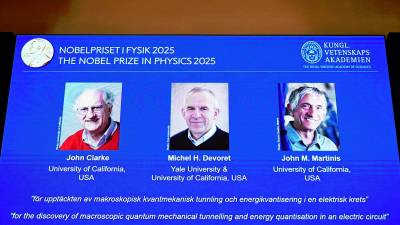STOCKHOLM: British scientist John Clarke, French researcher Michel Devoret and American physicist John Martinis have won the Nobel Prize in Physics for their groundbreaking work on quantum mechanical tunnelling.
The Nobel jury highlighted their contributions in putting quantum mechanics into practical action and enabling the development of various digital technologies from mobile phones to next-generation computers.
Their work has created opportunities for developing advanced quantum technology including quantum cryptography, quantum computers and quantum sensors.
Quantum mechanics describes how physical systems behave on extremely small scales where conventional physics no longer applies.
A normal ball hitting a wall bounces back while a quantum particle can pass straight through a comparable barrier in a phenomenon called tunnelling.
Ulf Danielsson, secretary of the Nobel physics committee, explained that these scientists successfully demonstrated this phenomenon within electric circuits.
Their experiments in the 1980s showed that quantum tunnelling could be observed on a macroscopic scale involving multiple particles by using superconductors.
Danielsson noted this prize recognises experiments that bring quantum phenomena up to scales humans can understand and measure directly.
Olle Eriksson, chair of the Nobel Committee for Physics, emphasised that quantum mechanics forms the foundation of all modern digital technology.
Clarke, an 83-year-old professor at the University of California, Berkeley, described the award as the surprise of his life during the announcement.
Devoret, aged 72, holds positions at University of California, Santa Barbara and as professor emeritus at Yale University.
Martinis, born in 1958, also serves as a professor at the University of California, Santa Barbara.
Clarke revealed the scientists had focused purely on physics during their experiments without realising the practical applications that would follow.
He acknowledged they never anticipated their discovery would have such significant technological impact.
When asked about everyday applications, Clarke noted his mobile phone conversation demonstrated how their work underpins modern communications.
He later emphasised the vital importance of his colleagues’ insights and hard work in achieving this recognition.
Like many Nobel laureates, all three conducted their research in the United States despite their different national origins.
Clarke expressed concern about potential budget cuts to science programmes announced by President Donald Trump.
He warned such reductions would cripple important research and prove disastrous if continued.
Major US institutions typically dominate Nobel science prizes due to longstanding investment in basic science and academic freedom.
Eleanor Crane, a quantum physicist at King’s College London, described Devoret’s move to the US as an example of brain drain.
She noted this trend is currently being reversed under new administrative approaches.
Trump’s proposed funding cuts to research universities have raised fears about America losing its scientific advantage.
The physics prize follows Monday’s medicine award to a US-Japanese trio for immune system research.
Mary Brunkow, one of the medicine laureates, also stressed the importance of federal funding for promoting and supporting scientific advancement.
The chemistry Nobel will be announced on Wednesday followed by literature on Thursday and the peace prize on Friday.
The economics prize concludes the 2025 Nobel season on October 13.
Each Nobel prize includes a diploma, gold medal and a $1.2 million cheque shared among multiple winners.
The 2025 laureates will receive their awards at formal ceremonies in Stockholm and Oslo on December 10, the anniversary of Alfred Nobel’s death. – AFP
